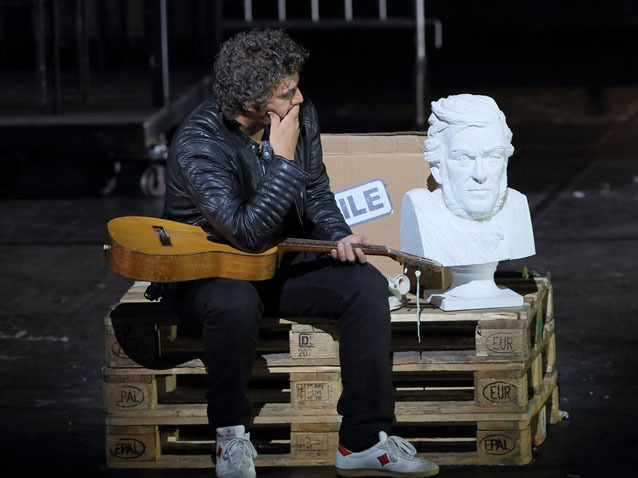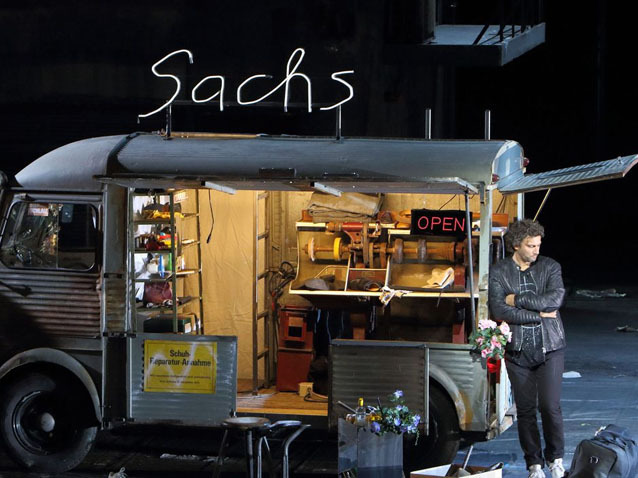 © Winfried Hoesl
© Winfried Hoesl
It is David Bösch fifth direction at the Bavarian State Opera and this new creation shows the characteristics of his work and his stage designer Patrick Bannwart. The whole story takes place in a dark and miserable, nearly apocalyptical environment to be dedicated to the late 70s - costumes by Meentje Nielsen. The city of Nuremberg is preparing the prestigious open air event of Johannisnacht and the Meistersinger competition on the mainsquare.

The star of the evening, Munich born Jonas Kaufmann in his long awaited role debut as Walter von Stolzing comes first on stage in jeans, T shirt, leather jacket all in black, headphones, guitar and a small travel bag, a cool youngster in a mixture of hanging around, on his trip of self finding. Eva elegantly flies over the stage on her way to the church service, this taking place in a procession and the love story begins. She is a self conscious emancipated young girl out of a rich family background, her father Veit Pogner is a dandylike rich local entrepreneur and big sponsor of the upcoming event and donating his only daughter as a price to the winner. So, to win his freshly beloved girl, Walter starts immediately his career as a Meistersinger in the next scene presented as a kind of general rehearsal on a simple wooden elevated open air stage for the next day event. Metal scaffoldings around serve as tribunes for the expected audience.
David Bösch forms brilliantly the clash of generation, social behaviour, tradition and revolt in the definition and design of all participants. Beckmesser in his brown needlestripe suit succeeds impressively in showing his two fold personality as defendor of the traditional values and fierce fighter for the hand of Eva. The singers chair is a copy of the electric chair symbolising the brutal power of the old traditional society and system over every non conformists - Walter being the clear example. In the middle of the parties stands Hans Sachs as the sweet tempered and fatherlike shoemaker. Whimsical and witty he helps the young hero to win his Eva and as expected all the hearts of the audience on stage and in front of.
Most clever the setting in the second act, Hans Sachs running his business in an old Citroen Caravan with coffee machine and flower garden. It is the detailed, well elaborated and sensible direction of all the little movements on stage which makes the evening very entertaining, convincing in the interpretation of this huge opus by Wagner and modern. The final scene is a multi media spectacle copying modern formats as the Eurovision song contest, here by Pognervision. Video installations and light shows accompany the presentation of the stars, the choir settled all around the open air stage, Walter wins his Eva and a big golden cup, but refuses his masterhood and participation in the tradition. He takes the hand of his Eva, his guitar and baggage and together they leave the scene without looking back walking into a new aera.

The musical presentation of the evening is outstanding thanks to Munich artistic head Kirill Petrenko. He once more shows his talent for Wagner and mastering the gigantic partiture. His conducting is fresh, vivid in speed, sharp and exact in intonation, full and wellbalanced in the sound. There is no overload or exaggeration in volume but excitement, positive concentration and addiction in the play. All small details are hearable, the voices keep priority. All of the singers, including the best prepared choir of the Bavarian state opera, fulfill their task without any weaknesses.
Munich born Jonas Kaufmann acclaims the most heartly applause for his lyric and powerful Walter, another role debut for him. His voice has well recovered after his pause with his warm and dark timbre. His sound modulation is flexible, his tones are safe and his articulation is well understandable. Wolfgang Koch has volume and power which he needs in this demanding role of Hans Sachs. Tall and voluminous by stature he sovereigns the action and his acting talent is well recognizable. Markus Eiche is similar strong in playing and singing. His Beckmesser reaches lyric color as well as witty sharpness and sublime humor. Sara Jakubiak soprano is dry and dramatic, showing herself very determined in the role interpretation of Eva. A very good performance of Benjamin Bruns as David clearly positions these role more central than normal and entertains the attentive audience. There is general affirmation for this fresh and clever interpretation, clear of political and nationalist attitude and the final applause is strong and long.
the 25 of May, 2016 | Print
Comments